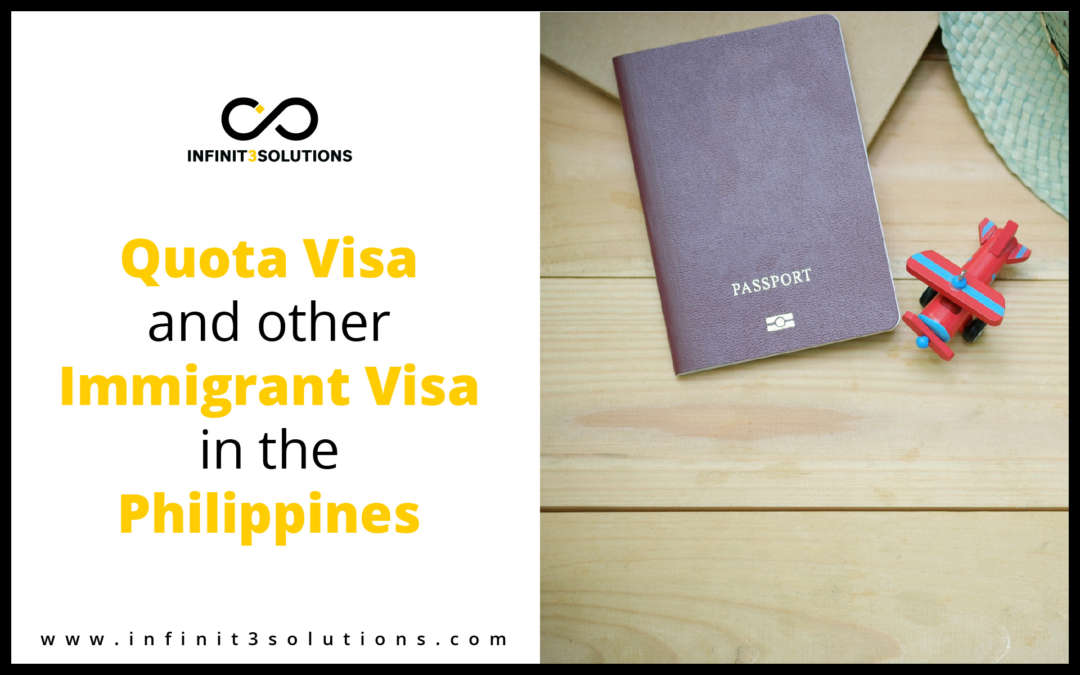There are many reasons why a lot of people from different countries wants to visit the Philippines. It can be for vacation, work/business, or medical purposes. Before we get started on Quota Visa and other immigrant visas, let us take a look briefly on a Tourist visa.
The need to acquire a visa to enter the country depends on the agreement between the Philippines and your country. The majority on the list belongs to the “30-day group” wherein a person can stay in the country for 30 days without the need for a visa. For the rest, you may avail on visa on arrival. The best course of action is to check with the embassy site directly.
Before you can pass through the Immigration gates, you need to present a return ticket and your passport should be valid for at least 6 months.
Tourist Visa holders may extend their visas without any problem at the Bureau of Immigration, provided of course that the purpose of your stay is purely leisure. However, if have decided to stay in the Philippines longer, and for various reasons, such as work, establishing a business, or for retirement; here are some visa options:
Immigrant Visas
These are for foreign nationals who wish to become permanent residents of the Philippines. Immigrant Visas under Section 13. Here are some options:
Quota Immigrant Visa
Nationals of countries which have diplomatic relations with the Philippines and grant the Filipinos the same immigration privileges under the principle of reciprocity can avail of this type of visa. Although, as the word “Quota” implies; the Bureau of Immigration does not grant in excess of fifty (50) of any one nationality or without nationality for any one calendar year.
Quota visa provides two major advantages. First, is granting the holder a lifetime of residency. Second is, to be able to work or to conduct business. However, as mentioned earlier, there are only 50 slots granted every year, so securing a slot is very difficult. If you are interested, here are the requirements:
- At least a bank deposit of USD 50,000.00, and transferred via a foreign bank, with a bank certificate. Or, documents showing ownership/purchase of a condominium unit acquired within 4 years prior to application. Lastly, (and/or) documents showing ownership of or investment in an existing corporation, enterprise, or business (shares of stocks), with proof that the amount invested came from was inwardly remitted from a foreign bank.
- A letter request addressed to the Commissioner from the applicant stating that: he has a valid passport at the time of application; does not belong to the deportable foreign nationals enumerated under Section 29 and 37 of the Philippine Immigration Act of 1940 and possesses the qualifications and skills beneficial to the country.
- 2 character reference letters, stating the applicant’s good moral behavior in the country. Preferably with details on how they have known the applicant.
- Accomplished application form (CGAF). Photocopy of passport bio-page and latest admission with valid authorized stay.
- Stamp issued by the Bureau of Quarantine appearing in applicant’s passport or travel document.
- Valid National Bureau of Investigation (NBI) Clearance.
- Bureau of Immigration Clearance Certificate.
13A – Non-Quota Immigrant Visa (by marriage)
As the name suggested, this type of visa is issued to foreigners (whose countries also provide permanent residence to Filipinos), with a valid marriage contract recognized by the Philippines to a Filipino citizen. This type of visa allows the holder to stay in the Philippines indefinitely and to seek employment as well. A special working permit, valid and renewable every 3 months will be provided while the visa is still in process. Once approved, there is a probationary status for 1 year in which the applicant will be evaluated if he is eligible for conversion to permanent residence status. Lastly, there is no need for a special working permit after the probationary period. Here are the requirements:
- Joint letter request addressed to the Commissioner from the applicant and the petitioning Filipino spouse.
- Duly accomplished application form.
- Marriage contract or marriage certificate.
- Birth Certificate or certified true copy in Bureau of Immigration issued Identification Certificate as a Filipino citizen of the Filipino spouse.
- Photocopy of passport bio-page and latest admission.
- Valid National Bureau of Investigation (NBI) clearance.
- Bureau of Immigration certificate
- An original or certified true copy of the Bureau of Quarantine Medical Clearance.
Temporary Resident Visa (TRV)
This type of visa is given to a foreign national, married to a Filipino, recognized by Philippine laws but, whose country does not grant permanent residency to Filipinos. The temporary Resident Visa is valid for 5 years and can be extended. The applicant can also avail of the Special Work Permit, valid and renewable every 3 months. Here are the requirements:
- Completely filled out application form
- Joint letter request addressed to the Commissioner from the applicant and the petitioner.
- Photocopy of passport bio page and latest admission with valid authorized stay (at least 30 days).
- Birth certificate of the petitioning Filipino spouse.
- Marriage certificate or marriage contract.
- Valid National Bureau of Investigation (NBI) clearance.
- Bureau of Immigration clearance
- Bureau of Quarantine medical clearance.
Final thoughts:
Just like processing other legal documents here in the Philippines, getting a visa can be overwhelming also. To save you from headache and hassle of going back and forth to Immigration or government agencies, we suggest hiring a professional who can process this for you. Contact us today and let our consulting expert process your visa for you.
If the above-mentioned visas seem to be unviable for you, stay tuned for our next post for we will discuss the different types of Special Visas.
Reference:

